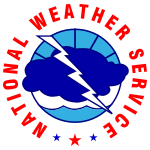National Hurricane Center
|
|||
|---|---|---|---|
| State level | Department of a federal agency of the United States | ||
| Position of the authority | Weather service | ||
| Supervisory authority (s) | National Weather Service (National Oceanic and Atmospheric Administration) | ||
| Consist | since 1898 | ||
| Headquarters | Miami (Florida) | ||
| Authority management | Kenneth Graham | ||
| Website | www.nhc.noaa.gov | ||
The National Hurricane Center ( NHC ) is a division of the Tropical Prediction Center affiliated with the National Weather Service of the United States and subordinated to the National Oceanic and Atmospheric Administration (NOAA). The seat is in Miami , Florida .
Function and history
The foundation goes back to an instruction of the American President William McKinley on December 5, 1898, with which the National Weather Service was commissioned to set up an early warning network to protect against tropical cyclones. With the advances in communication and forecasting technology, the competencies were finally brought together in Miami and in 1967 the NHC was given responsibility for the entire North Atlantic.
Its job is to monitor and predict the likely behavior of tropical cyclones in the Atlantic and Pacific Oceans east of longitude 140 west of Greenwich. Although it is a US government agency , based on the decision of the World Meteorological Organization , the NHC is the central information point for the area whether or not a storm threatens the United States area. In 1988 the Eastern Pacific Hurricane Center in San Francisco was dissolved and the area was added to the NHC in Miami.
In 1992, Hurricane Andrew blew the WSR-57 weather radar and wind gauges from the roof of the building that was then the headquarters of the NHC. The weather radar was replaced by NEXRAD , and in 1995 the agency moved to a new hurricane-proof facility on the grounds of Florida International University .
Former director of the National Hurricane Center, Bob Simpson, is co-author of the five-point Saffir-Simpson Hurricane Wind Scale , which is used to assess the strength of hurricanes.
If a tropical storm or hurricane is expected within 36 hours, the NHC will issue warnings through the news media and NOAA weather radio . The hurricane specialists at the NHC work from the beginning of May to the end of November in continuous eight-hour shifts and observe the weather developments in the Atlantic and Eastern Pacific. (The situation in the Pacific west of 140th longitude is monitored by the Joint Typhoon Warning Center .) As soon as a depression develops, they issue warnings every six hours. When the storm threatens land, the warnings are published more often. In doing so, they work together with responsible bodies in the countries concerned. Each notification is signed by the hurricane predictive specialist by his or her last name, sometimes making joint predictions with other NHC personnel.
| Organization that monitors the area on behalf of WMO | |
| Tropical Cyclone Programs | |
| pool | Responsible RSMCs * and TCWCs ** |
| North Atlantic | National Hurricane Center * (USA) |
| Eastern North Pacific | National Hurricane Center * (USA) |
| Central North Pacific | Central Pacific Hurricane Center * (USA) |
| Western North Pacific | Japan Meteorological Agency * |
| South and Southwest Pacific |
Fiji Meteorological Service * Meteorological Service of New Zealand ** Papua New Guinea National Weather Service ** Bureau of Meteorology ** (Australia) |
| Northern Ind | India Meteorological Department * |
| Southwest Indic | Météo-France La Réunion * |
| Southeast Indic |
Bureau of Meteorology ** (Australia) Meteorology and Geophysical Agency of Indonesia ** |
Organization and staff
Directors of the National Hurricane Center
- Gordon Dunn (1965-1967)
- Robert Simpson (1967–1973)
- Neil Frank (1973–1987)
- Bob Sheets (1987-1995)
- Bob Burpee (1996-1997)
- Jerry Jarrell (1998-2000)
- Britt Max Mayfield (2000-2007)
- Xavier William Proenza (2007)
- Edward N. Rappaport (2007-2008)
- Bill Read (2008–2012)
- Richard Knabb (2012-2017)
- Kenneth Graham (since 2018)
Current senior hurricane specialists
- Lixion Avila , since 1987
- Jack Beven, since 1999
- James Franklin , since 1999
- Richard Knabb, since 2005
- Richard Pasch, since 1989
- Stacy Stewart, since 1999
See also
- Joint Typhoon Warning Center (JTWC)
Web links
- National Hurricane Center (English / Spanish)
- Hurricane Warnings and Forecasts (NHC news page)
- History of the NWS Forecast Office in Miama (English)
Individual evidence
- ^ National Hurricane Center . Accessed September 13, 2018.
- ↑ Atlantic Oceanographic and Meteorological Laboratory , Hurricane Research Division: Frequently Asked Questions: What regions around the globe have tropical cyclones and who is responsible for forecasting there? . NOAA . Retrieved May 31, 2008.

